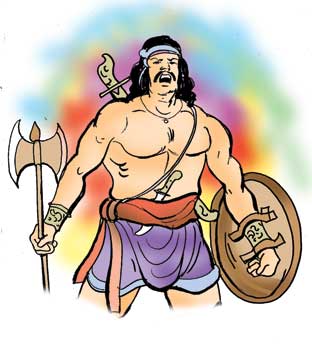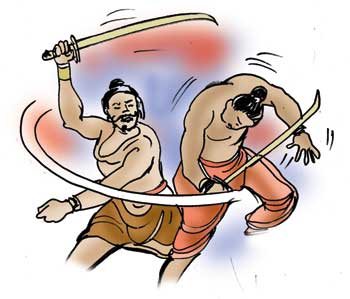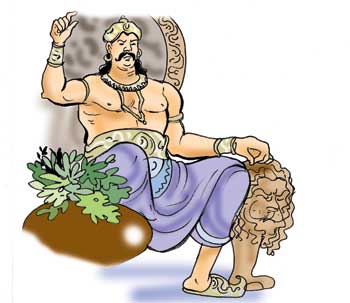
Enemies become friends~This article is part of a continuing series on the ‘Mahavamsa,’ the recorded chronicle of Sri Lankan history~
2. He landed in the North of the country and conquered a number of villages. Some villages were set on fire and a lot of destruction was caused. Quite a number of Sinhala leaders were killed. Some were taken as prisoners. A lot of elephants that were captured were sent abroad. After a lot of looting, he is said to have returned to the Chola country. 3. Thence forward, King Parakramabahu adopted a new strategy. He thought of making friends with the enemy. He wanted to be friendly with Prince Kulasekera. King Parakramabahu meant to take revenge from the Chola king for upsetting his plan. Prince Kulasekera got caught to the Sinhala king's trap and accepted King Parakramabahu as a real friend. For a moment he forgot all the help he received from the Chola king, when he was in trouble. Turning ungrateful to the Chola ruler, he tried to help his new friend.
5. The term "Dandanayake," refers both to a name and a title. This rank was given to civil administrators who held military positions as well. Provinces in the frontier and places of military significance were under their control. They also held power over trade transactions in certain provinces. Thus they were entitled to a certain amount of the tax. The amount, of course, was decided by the officers who served under them. 6. Representatives of trade unions and village councils too joined them. All of them met together, discussed and decided on the amount to be paid. This is proved by historical records. However, according to the inscription, after removing the heads of the Sinhala commanders, the Chola officers who had come to his help were sent back. It was prohibited for the Cholas to cross the Pandya boundary. A hostile attitude was adopted towards the Chola country.
8. All these are facts mentioned in the inscription. In another inscription written in 1177 A.D., the following mention is made. Prince Kulasekera, with the help of the Sinhalese has removed a statue, that was in the centre of the Chola Kingdom, to another place. Furthermore, he had been victorious, after fighting the Cholas.
|
|| Front
Page | News | Editorial | Columns | Sports | Plus | Financial
Times | International | Mirror | TV
Times | Funday
Times || |
| |
Reproduction of articles permitted when used without any alterations to contents and the source. |
© Copyright
2008 | Wijeya
Newspapers Ltd.Colombo. Sri Lanka. All Rights Reserved. |

 4. He went to the extent of giving military help to King Parakramabahu, to fight the Cholas. This is stated in a Chola inscription. Earlier, Prince Kulasekera had nailed the heads of the Sinhala commanders, onto the gates of the city of Madhura. These were the heads of Ilankapura Dandanayake and Jagathraya Dandanayake. These heads were removed from that place.
4. He went to the extent of giving military help to King Parakramabahu, to fight the Cholas. This is stated in a Chola inscription. Earlier, Prince Kulasekera had nailed the heads of the Sinhala commanders, onto the gates of the city of Madhura. These were the heads of Ilankapura Dandanayake and Jagathraya Dandanayake. These heads were removed from that place. 7. King Parakramabahu sent gifts to Prince Kulasekera. The army officers of Prince Kulasekera too managed to make friends with the Sinhala King. They received gifts from the king. The Chola king who was badly offended over the turn of events began to treat Prince Kulasekera as a real traitor and sent armies to fight him. Prince Kulasekera was defeated. Prince Veera Pandya was brought back to the city of Madhura and he was made king.
7. King Parakramabahu sent gifts to Prince Kulasekera. The army officers of Prince Kulasekera too managed to make friends with the Sinhala King. They received gifts from the king. The Chola king who was badly offended over the turn of events began to treat Prince Kulasekera as a real traitor and sent armies to fight him. Prince Kulasekera was defeated. Prince Veera Pandya was brought back to the city of Madhura and he was made king.